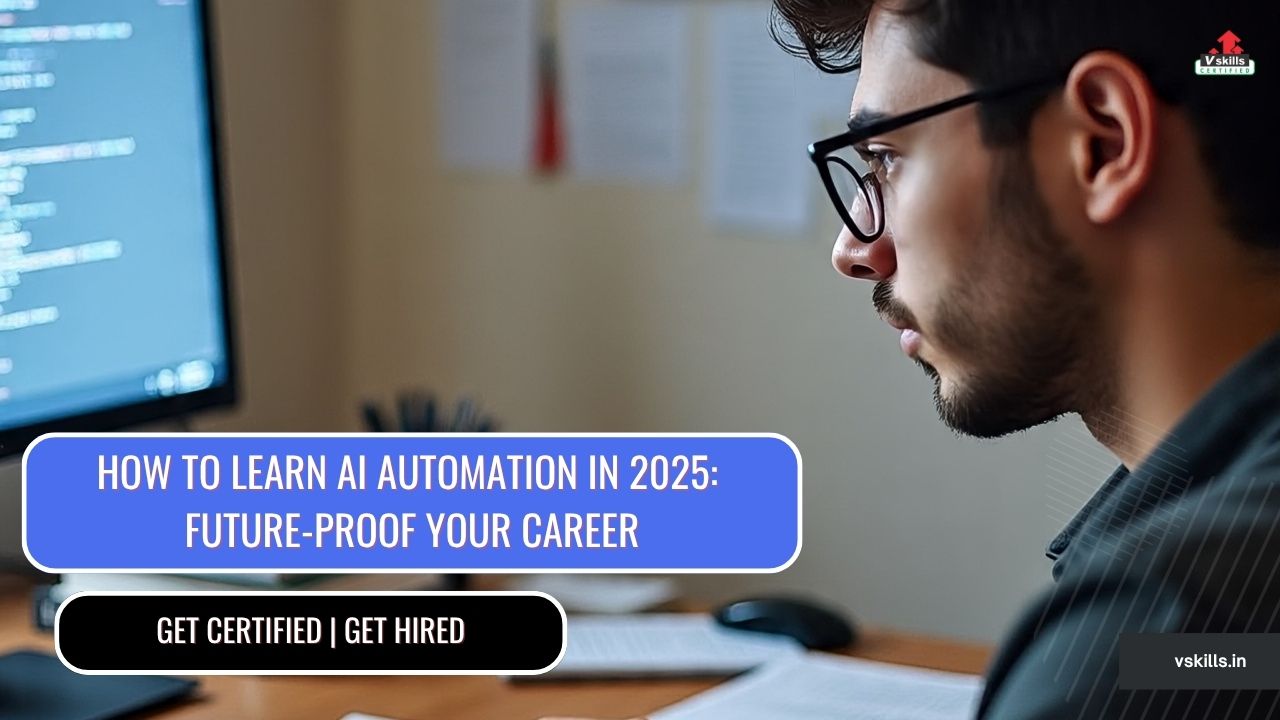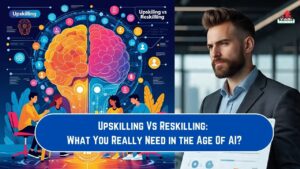As we move further into the 2020s, one reality is becoming crystal clear: the workplace isn’t just evolving, it’s undergoing a full-scale transformation. In 2025, we are witnessing a revolution fuelled by technology that is faster, deeper, and more impactful than any industrial or digital shift before. At the centre of this transformation stands Artificial Intelligence (AI) automation, a convergence of intelligent systems, data-driven decision-making, and task execution without human intervention. From the outside, AI automation might appear as just another technical advancement. But in practice, it is completely redefining the future of work:
- Intelligent chatbots now handle millions of customer service interactions daily, with near-human empathy and instant response times.
- Machine learning algorithms predict inventory needs, supply chain issues, and product trends with unprecedented accuracy.
- Natural language processing enables companies to analyse sentiment across social media and customer reviews in real time.
- Generative AI tools like ChatGPT, Claude, and Sora are transforming how content is created, code is written, and decisions are supported across industries.
In short, AI has moved from the backroom to the boardroom, from being a research experiment to becoming the foundation of scalable, intelligent operations across every major sector.
AI Is Everywhere, Not Just in Tech
One of the most critical shifts happening in 2025 is that AI is no longer exclusive to tech companies or cutting-edge startups. It is now embedded across:
- Finance: Automating fraud detection, credit scoring, and customer onboarding.
- Healthcare: Enhancing diagnostics, predicting disease outbreaks, and managing patient data securely.
- Logistics & Supply Chain: Forecasting demand, optimizing routes, and reducing operational inefficiencies.
- Education: Powering adaptive learning platforms and personalized student support.
- Retail & E-commerce: Delivering hyper-personalized shopping experiences and inventory automation.
- Creative industries: Generating video content, music, design drafts, and even scripts with AI-assisted tools.
This widespread adoption means that no matter what field you’re in, chances are that AI is already starting to impact it, and will continue to do so even more significantly in the coming years.
Dual Nature of the AI Shift: Threat or Opportunity
With this rapid integration of AI automation comes a critical fork in the road for professionals: Will you become someone who is empowered by AI, or displaced by it?
- Routine and repetitive roles are being replaced by software bots and intelligent agents.
- However, new roles are emerging that require AI oversight, ethical judgment, integration, and strategy.
- The demand is rising not just for technical specialists, but for adaptable professionals who understand AI and can use it wisely.
The truth is, this new era presents both a challenge and an opportunity. Those who fail to adapt risk being left behind. But those who invest in learning, stay curious, and embrace innovation are poised to thrive in future-proof careers that didn’t even exist a few years ago.
What it means to Future-Proof Your Career in 2025
In a world where AI systems can write articles, summarize legal contracts, analyse medical scans, and automate entire workflows, what will your value be?
To remain relevant and competitive, it’s not enough to rely on past credentials or traditional career paths. You need to:
- Learn the fundamentals of AI and automation even if you’re not a techie.
- Gain hands-on experience with real-world tools and platforms that are shaping the AI landscape.
- Understand how AI is being applied in your industry, and what new opportunities or risks it introduces.
- Develop uniquely human skills like empathy, ethics, problem-solving, and leadership skills that AI cannot replicate.
- Build a strategic professional network that can support, mentor, and guide your growth.
These are the building blocks of career resilience and reinvention in the AI era.
What will you Learn in this Guide?
In this blog, we will walk you through a step-by-step roadmap on how to learn AI automation effectively in 2025 and beyond. Whether you’re just starting or already deep into your career, this guide will show you:
- How to access high-quality learning resources and certifications.
- Which technical and soft skills are in the highest demand?
- How to apply AI knowledge practically through projects and collaboration.
- How to ethically and strategically integrate AI into your career goals.
- How to position yourself as a valuable AI-literate professional on platforms like LinkedIn.
Step-by-Step Guide to Learn AI Automation
If you’re wondering how to start, where to focus your time, and how to make sure you’re not left behind in the AI boom, you’re in the right place.
Let’s dive in and start building a career that not only survives but thrives in the age of automation.
Step 1 – Embrace Lifelong Learning: The New Career Operating System
In 2025, degrees alone will no longer be enough to guarantee job security. What sets professionals apart is the ability to continuously learn, adapt, and grow with changing technology. Here’s how you can embrace lifelong learning in AI automation:
Take Online Courses
- Various Online Platforms offer structured courses in AI, machine learning, data science, and automation.
- For beginners: Start with “Elements of AI” or AI for Everyone by Andrew Ng.
- For intermediate/advanced learners: Dive into TensorFlow Developer Specializations or AI Product Management.
Earn Certifications
Certifications from credible bodies such as:
- Google Cloud Certified Machine Learning Engineer
- Microsoft AI Fundamentals
- IBM Applied AI Professional Certificate
- These not only validate your skills but also make your resume stand out.
Learn-by-Doing
You learn AI not just by watching videos, but by experimenting and building. Try coding mini-projects like chatbots, recommendation engines, or simple automation tools using Python.
Stay Updated
AI evolves rapidly. Subscribe to:
- Towards Data Science (Medium)
- MIT Technology Review
- The Gradient
- ArXiv Sanity Preserver (for recent research papers)
Tip: Set aside 30–60 minutes per week to learn something new.
Step 2 – Build Technical Proficiency: The Core of AI Automation
While not every role requires you to be a programmer, having technical fluency is increasingly vital. It empowers you to understand how AI works, collaborate with engineers, and even build prototypes. Key Technical Skills to Learn:
Programming Languages
- Python: The #1 language for AI and automation. Start here.
- R: Popular in data analytics and statistics.
- SQL: Essential for working with databases.
AI & ML Frameworks
- Scikit-learn: Great for classic machine learning models.
- TensorFlow and PyTorch: Industry-standard frameworks for deep learning.
- OpenCV: For computer vision projects.
- Transformers (by Hugging Face): For working with advanced NLP models.
Cloud Computing
Learn how to deploy AI solutions on the cloud using:
- Amazon Web Services (AWS)
- Google Cloud Platform (GCP)
- Microsoft Azure AI Services
Data Analysis & Visualization
- Tools: Pandas, NumPy, Matplotlib, Power BI, Tableau
- Skill: Analyse trends, build dashboards, and communicate insights.
Automation Tools
- UiPath, Blue Prism, Power Automate for Robotic Process Automation (RPA).
- Zapier, Integromat, n8n for no-code automation workflows.
Step 3 – Develop Soft Skills: The Human Edge AI Can’t Replace
While AI excels at data processing and predictions, it lacks emotional intelligence, ethical judgment, and creativity, traits that define great human professionals. In a 2025 workplace driven by smart machines, human soft skills are your secret weapon.
Critical Thinking
- Evaluate AI-driven outputs.
- Ask better questions.
- Spot patterns and anomalies that machines might miss.
Problem-Solving
- AI is a tool. You bring the context, creativity, and cross-domain thinking to solve real-world challenges.
Communication
- Explain technical AI concepts to non-technical stakeholders.
- Work across departments like marketing, legal, and sales.
Adaptability
- The tools you use today may be obsolete in two years.
- Be willing to unlearn and relearn continuously.
Emotional Intelligence
- As automation handles tasks, people management and interpersonal skills become even more important for leadership roles.
Step 4 – Gain Practical Experience: Turn Theory into Results
Learning concepts is good. But demonstrating real-world skills is what gets you hired. In 2025, employers prioritize practical portfolios over theoretical credentials. How to Build Experience:
Personal Projects
Build AI-powered applications like:
- Chatbots
- Resume screeners
- Image recognition tools• Email automation workflows
Document these projects on GitHub, your portfolio website, or LinkedIn.
Open-Source Contributions
Contribute to GitHub repositories in AI/ML projects.
- Learn from senior developers.
- Get feedback on your code.
- Add value to real-world systems.
Freelance & Intern
Use platforms like Upwork, Fiverr, and Internshala to gain early experience working on small AI tasks, automations, or data wrangling.
Participate in Hackathons
- Sites: Kaggle, Zindi, HackerEarth, Devpost
- Compete in problem-solving challenges.
- Network with like-minded individuals.
- Get noticed by recruiters and companies.
Step 5 – Build Your Professional Network: Don’t Just Learn, Be Seen
Just like in AML/KYC or finance, LinkedIn is your gateway to opportunity in AI and automation. Building a powerful online presence, especially on LinkedIn, can dramatically boost your visibility and career prospects. Steps to Build a Strategic Network:
Optimize Your LinkedIn Profile
- Use a professional photo and compelling headline: “Aspiring AI Automation Engineer | Python | NLP Enthusiast”
- Add certifications and projects.
- Share weekly posts about what you’re learning.
Engage with AI Content
- Follow thought leaders like Andrew Ng, Cassie Kozyrkov, and Lex Fridman.
- Comment on articles and reshare key trends.
Join AI-Focused Communities
- AI/ML groups on LinkedIn, Reddit, Discord
- Local meetups and webinars
Publish Original Content
Blog on Medium or LinkedIn about:
- a) “What I Learned from Building My First AI Chatbot”
- b) “Top 5 Tools to Automate Your Daily Workflow”
Tag tools and professionals to reach a wider audience. Networking isn’t about collecting contacts, it’s about building credibility, connections, and collaborations.
Step 6 – Explore Diverse Career Opportunities in AI Automation
AI automation is not just for data scientists or software engineers. A wide range of roles is emerging across industries.
Career Pathways You Can Pursue:
- AI/ML Engineer: Designs and builds models that automate tasks or predict outcomes.
- Data Scientist / Data Analyst: Analyses trends and extracts business value from data using machine learning techniques.
- Automation Consultant: Advises companies on how to streamline operations using AI, RPA, and workflow automation tools.
- Product Manager – AI Tools: Leads the development and launch of AI-powered features/products.
- Trainer or Prompt Engineer: Trains AI systems and curates data; increasingly relevant with generative AI like ChatGPT and Claude.
- Ethics & Compliance Officer – AI Systems: Ensures AI use complies with regulations and fairness standards.
- AI Sales Engineer or Evangelist: Combining tech understanding with communication to sell AI solutions.
By aligning your interests with one of these tracks, you can create a tailored learning roadmap.
Step 7 – Understand Ethical & Responsible AI
As AI becomes more powerful, so does the need for ethical oversight. Organizations are under pressure to build fair, unbiased, and transparent systems.
Key Ethical Themes:
- Bias in AI Models: Algorithms trained on biased data may perpetuate discrimination.
- Privacy & Data Protection: Responsible handling of user data is non-negotiable (think GDPR, HIPAA).
- Explainability: Users should understand why an AI made a decision.
- AI & Job Displacement: Navigating the fine line between efficiency and responsibility.
By understanding these aspects, you not only make better AI systems, but you also become a trusted voice in boardrooms and policy discussions.
Conclusion: Future-Proofing Your Career in the Age of AI Automation
The future is no longer a distant concept; it’s here, now. And AI is not just participating; it’s leading the charge. From predictive analytics in healthcare to intelligent automation in finance and customer service, AI is redefining how we work, learn, and make decisions. What this means for professionals, regardless of industry or experience level, is clear: the rules of the career game have changed.
Whether you are a fresh graduate deciding where to start, a mid-career professional looking to remain relevant, or a team leader navigating a tech-driven workplace, 2025 is your call to action. It’s time to stop watching from the sidelines and start becoming an active participant in this AI-powered future.
To successfully future-proof your career, here are five powerful principles to guide your journey, now expanded for clarity and impact:
1. Start Learning AI Today
Don’t wait for the perfect time to start; AI is moving too fast for hesitation. Begin wherever you are:
- If you are new, explore beginner-friendly resources like “Elements of AI,” “AI For Everyone,” or “Introduction to Machine Learning with Python.”
- • If you are already in a tech role, dive deeper into deep learning, model deployment, or specialized areas like NLP and computer vision.
- • Build small side projects, an AI chatbot, a resume screener, and a tool that summarizes articles. These hands-on projects cement your understanding and serve as a portfolio for job opportunities.
- Earn certifications from reputable platforms (e.g., Google, IBM, Microsoft). They validate your efforts and open up hiring conversations.
- Bottom line: Start now. Learn by doing. And don’t stop learning.
2. Blend Technical and Human Skills
Yes, AI tools are powerful, but it’s the people who understand both the tech and the context who stand out. Being “just a coder” or “just a manager” isn’t enough anymore.
- Learn to code, analyse data, or automate workflows.
- But also learn how to communicate, empathize, lead, and collaborate.
- For example, an AI model can generate insights, but it’s your critical thinking and communication that determine how those insights get applied in a business or ethical context.
Hybrid professionals, those who merge soft and hard skills, are the leaders of the future.
3. Build Your Professional Brand
Your technical skills won’t matter if no one knows about them. In the digital economy, visibility is credibility.
- Optimize your LinkedIn profile with relevant keywords, a professional headline, and real project examples.
- Share your learning journey, write short posts about AI trends, or publish reflections on ethical issues in AI.
- Join and contribute to communities, such as Discord channels, GitHub, Twitter, X, AI forums, or local meetups.
- Engage, don’t just consume, comment on AI posts, ask questions, and connect with thought leaders.
Your voice and visibility could be the difference between getting overlooked and getting recruited.
4. Focus on Real-World Impact
AI isn’t valuable because it’s trendy. It’s useful when it solves meaningful problems.
- Don’t build tools just for show. Ask: What is this AI model achieving? What real-world need does it address?
- Learn how AI is transforming your specific industry. For example:
a) In marketing, AI optimizes campaign targeting.
b) In logistics, it predicts delays.
c) In healthcare, it improves diagnosis accuracy.
- Align your projects and skills with use cases that matter—to users, businesses, or society.
When you focus on impact over gimmicks, your work speaks volumes, and you become indispensable.
5. Think Long-Term: Become a Strategic AI Thinker
In 2025, automation tools will come and go. Technologies evolve, APIs change, and libraries get deprecated. But strategic thinking lasts.
Future-proof professionals don’t just know how to use tools, they understand:
- Why is the tool needed?
- When to apply AI and when not to?
- What risks are involved?
- How to align AI with business goals, ethical frameworks, and user needs?
Aim to grow into a strategic thinker who can lead initiatives, not just execute tasks. Think like a product manager, a technologist, and an ethicist, and bring all those lenses into your AI journey.
Final Thoughts: Don’t Just Adapt, Lead the Change
AI is changing everything, but that doesn’t mean it has to leave you behind.
We’re standing at a pivotal moment in history. Artificial intelligence is transforming how we work, communicate, create, and make decisions. The pace is fast, but this isn’t a race you have to watch from the sidelines.
By stepping into a role where you understand both the technology and the human impact of AI, you’re not just keeping up, you’re getting ahead. You’re positioning yourself as a forward-thinking leader ready to guide your team, your company, or even your entire industry toward a smarter, more efficient, and more ethical future.



